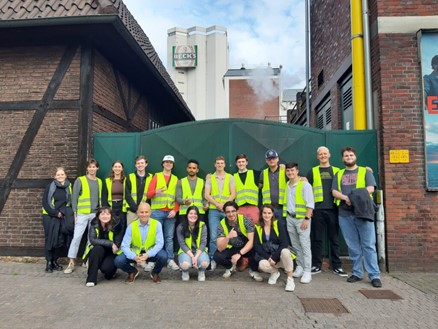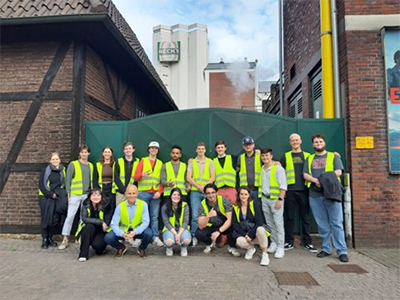Global Entrepreneurism, the Dickinson Way

Photo courtesy of the William G. and Elke Durden Dickinson-in-Germany Program,

Photo courtesy of the William G. and Elke Durden Dickinson-in-Germany Program.
Students combine classroom learning with hands-on experiences abroad
by MaryAlice Bitts-Jackson
After learning about what it takes to be a successful entrepreneur, a group of Dickinson students saw excellence and innovation in action at leading-edge businesses in Germany.
They’d enrolled in a Globally Integrated Semester (GIS) course, combining classroom learning in the spring semester with a summer study-abroad experience. This GIS course focused on global entrepreneurship and was taught by Steve Riccio, senior lecturer in international business & management, in partnership with the William G. and Elke Durden Dickinson in Germany study-abroad program.
Open to students in any major, the course began last spring with on-campus classroom study on best practices and case studies. The students then embarked on a two-week trip to Berlin and Bremen, Germany, where they met business leaders, educators and representatives of organizations that support German start-up ventures.
Video courtesy of the William G. and Elke Durden Dickinson in Germany Program.
“It was eye-opening,” noted William Giguere ’23 (international business & management), who appreciated the chance to dig into learning about global markets and was fascinated to discover ways that German business leaders altered business outputs and operations in response to the COVID-19 pandemic.
The GIS course also included tours of large plants, including the Mercedes-Benz and Becks Brewery facilities; German-language learning opportunities; and a meeting with members of the small business & entrepreneurship department at the University of Bremen.
“Our itinerary was packed with business visits and informational sessions, with plenty of free time mixed in” to explore restaurants and shops, wrote Sierra Stevens ’23 (international business & management), who especially enjoyed the tours and the opportunity to meet members of the Bremen senate.
The students emerged with an understanding of universal entrepreneurship principles. These include the notions that it’s easier to launch a business than to sell a product; brainstorming new products is less effective than brainstorming problems one wishes to solve; emotion drives consumer decision-making, and so entrepreneurs must understand prospective customers’ emotional journeys; and brainstorming problems can lead to better results than brainstorming new product ideas.
They also learned that culture plays an important role. Traditionally, for example, Germans have not been sympathetic to those who run a failed business venture—much less so than Americans. Today, German business leaders and educators explained to the students, this is changing, however. Germans increasingly see failure as a learning and growth opportunity that can be leveraged to create success.
“The program was phenomenal, from the heightened level of sophistication seen in the Mercedes-Benz factory to the attention to detail in the art of brewing beer,” wrote Kayden Tucker ’22, who earned a Dickinson theatre degree last spring. “I learned so much about global business, and I’m super-grateful for all of the experiences I had through this course.”
TAKE THE NEXT STEPS
Published August 22, 2022